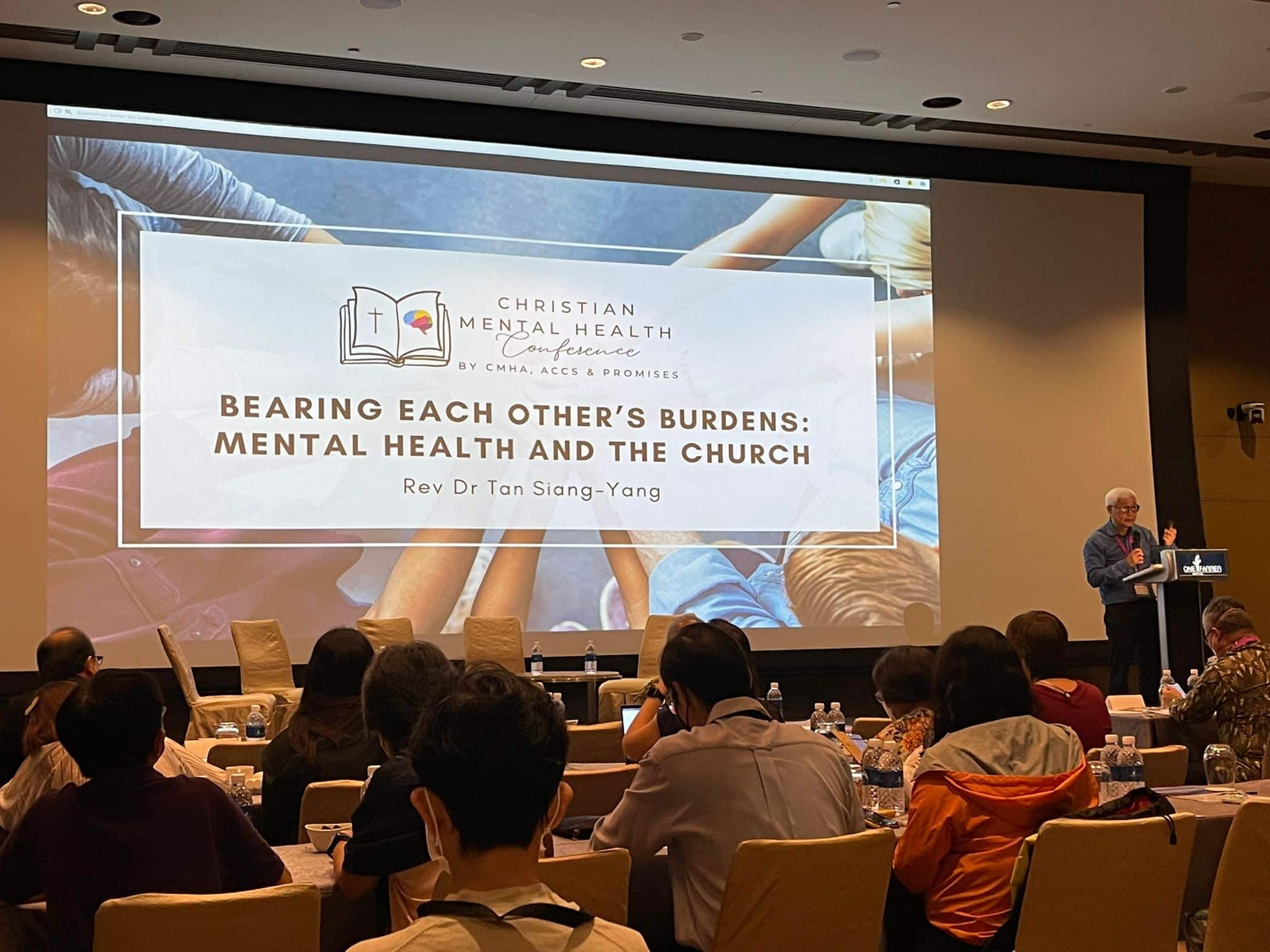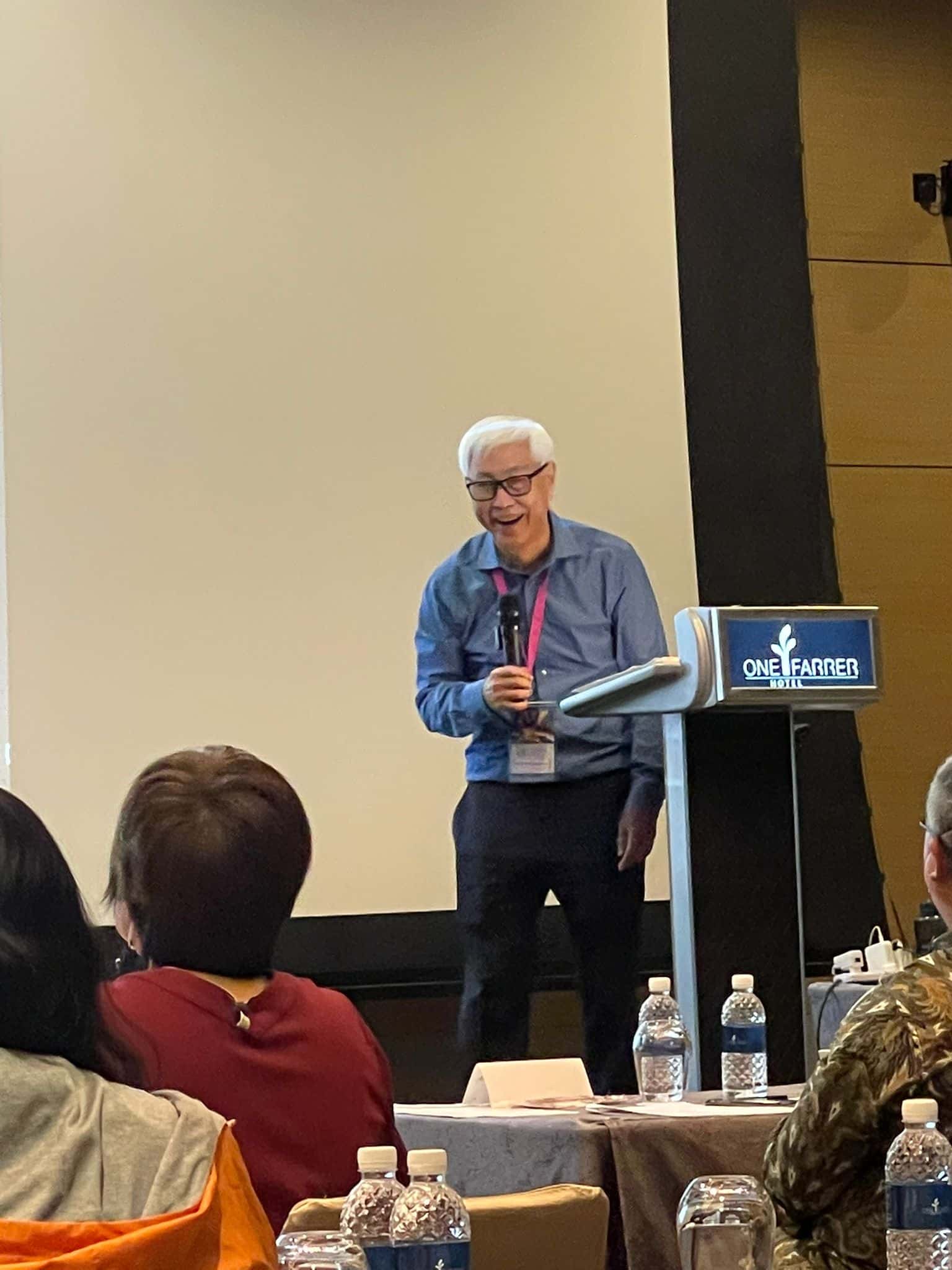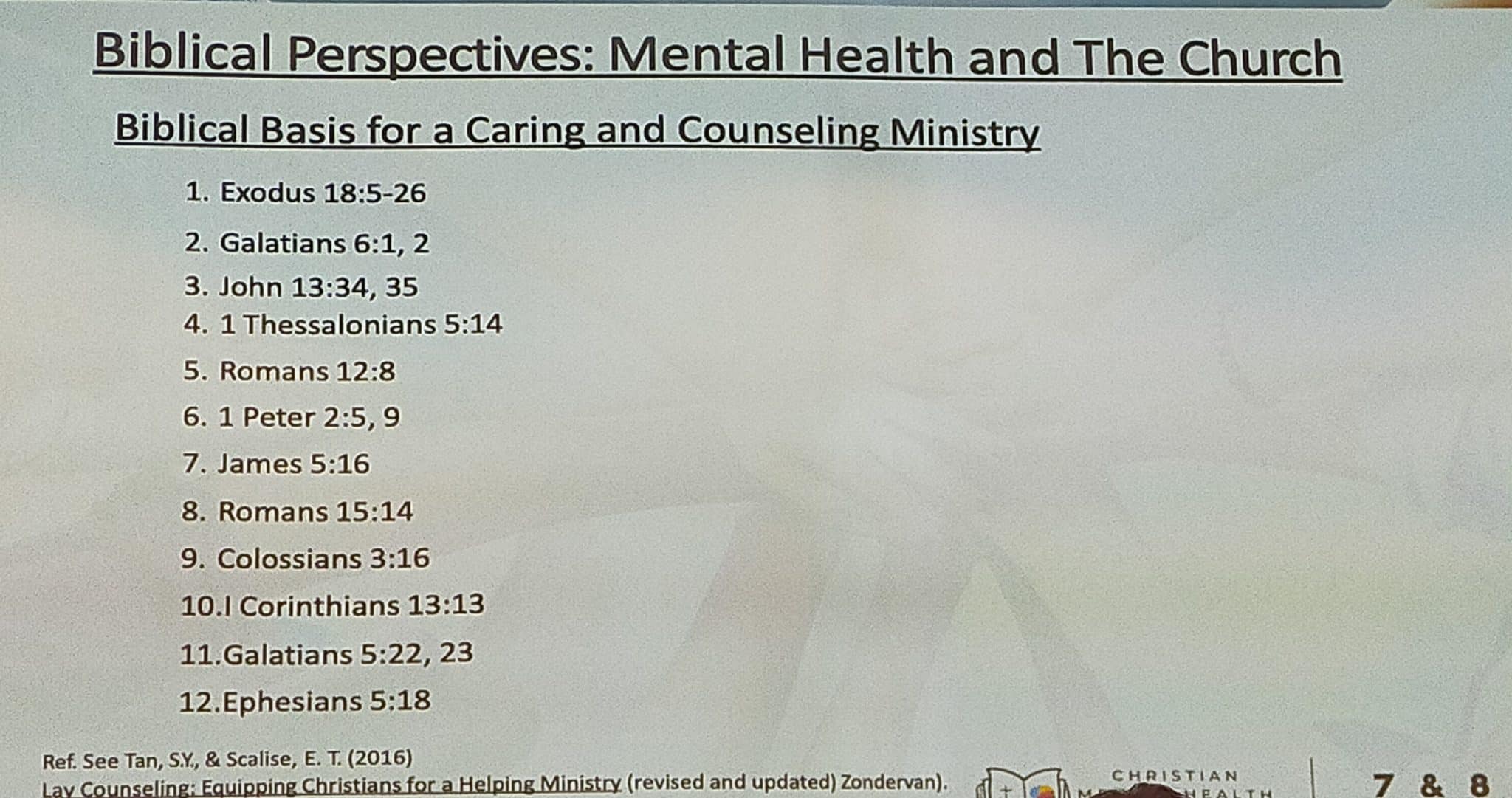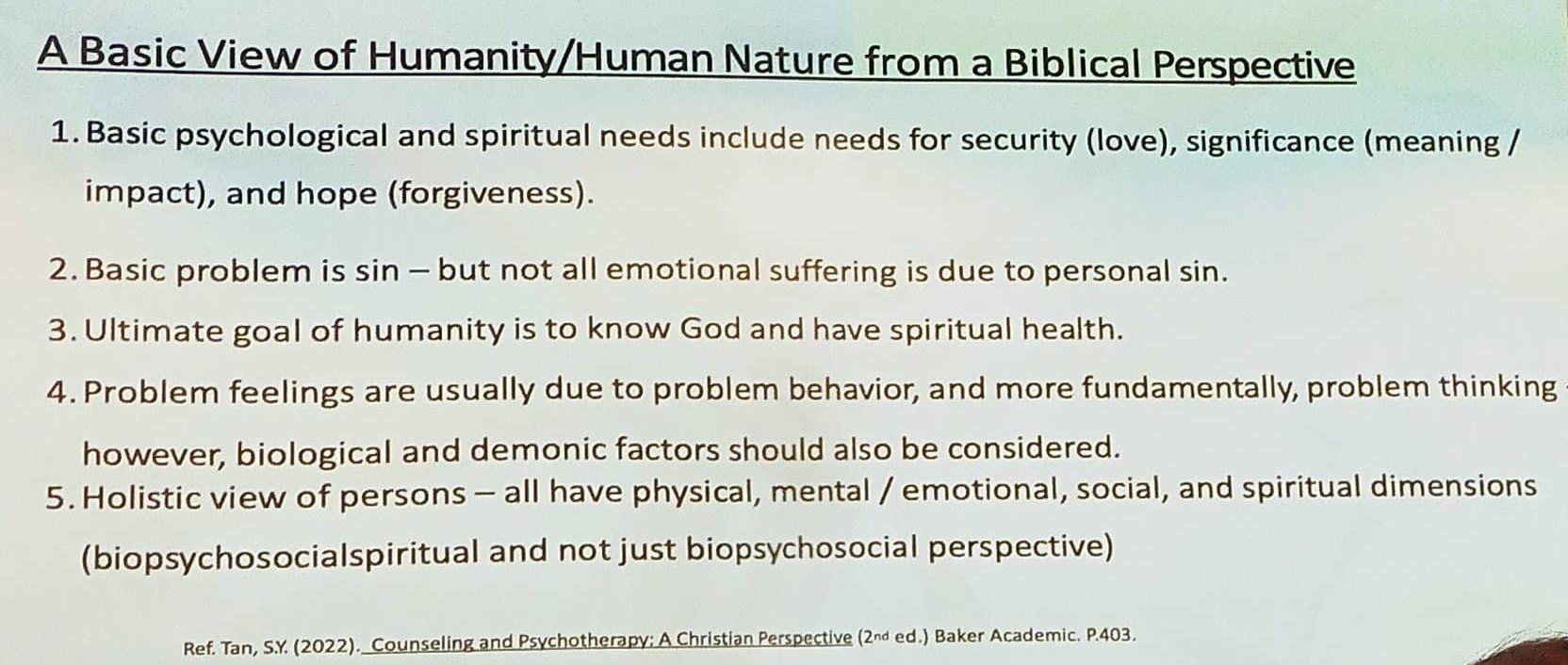Moses was “worn out” too: What is a biblical approach to mental health issues within the church?
by Christine Leow // July 13, 2022, 5:13 pm

Dr Tan Siang-Yang at the keynote address on Day 2 of the Christian Mental Health Conference 2022, which dealt with how pastors can care for their own mental health. Photo courtesy of Christian Mental Health Conference 2022.
He was working from morning till night.
The work was difficult. He had to teach, mediate disputes and provide spiritual counsel. It was hard work and it was heart work, requiring love and patience.
The work was lonely. He was the only one doing what he did.
Moses was in real danger of wearing himself out.
The work was thankless. Those for whom he laboured complained bitterly against him and they blamed him whenever things got tough.
Moses, the prophet and the leader of the Israelites exiting Egypt for the Promised Land, was in real danger of wearing himself out. There is no Biblical reference to being burnout but this account of Moses on the verge of being worn out (Exodus 18:18) comes close, said Dr Tan Siang-Yang, Senior Pastor Emeritus of the First Evangelical Church Glendale in Southern California.
Dr Tan is a licensed psychologist who is also a Senior Professor of Clinical Psychology at Fuller Theological Seminary and Fellow of the American Psychological Association. He serves as the Spiritual Director of the American Association of Christian Counsellors as well.
He was giving a keynote address on Day 2 of the second Christian Mental Health Conference (July 6-7).

With heart and humour, Dr Tan shared biblical perspectives on care and counselling ministries that churches can provide. Photo courtesy of Christian Mental Health Conference.
The event was jointly organised by the Christian Mental Health Advocates (CMHA), the Association of Christian Counsellors (Singapore), and Promises Healthcare, a private psychiatric and psychology clinic.
Over two days, more than 120 pastors and nearly 50 mental health professionals attended the conference for church leaders and allied health professionals to come together to provide support for mental health in churches, particularly for the pastors and full-time workers.

Participants, speakers and organisers of the Christian Mental Health Conference 2020. Photo courtesy of the Christian Mental Health Conference 2022.
Dr Tan shared some biblical perspectives on providing care for those with mental health issues within the church.
The need is great
According to the World Health Organization (WHO), Covid has caused great damage to mental health worldwide. It has triggered a 25% increase in the prevalence of anxiety and depression globally. By other estimates, the number may be as high as 40%.
The psychological and psycho-social consequences of the pandemic are expected to last up to 10 years after the crisis abates.
“Jesus called us to a discipleship lifestyle that is characterised by love.”
“This is a wake-up call to all countries to step up mental health services and support,” said Dr Tan.
In Singapore, suicide rates among the young aged 10 to 29 hit a record high of 112 last year, an increase of 11 cases from the year before.
Added Dr Tan: “We have no choice. We must respond. Jesus called us to a discipleship lifestyle that is characterised by love.”
This love is demonstrated by the care we give to those within the church as well as outside of it who struggle with their mental health.
Caring and counselling: What the Bible says
Caring for those with mental health issues within the church is biblical, said Dr Tan. He shared 14 verses that made references to this.

The verses Dr Tan shared that lay a biblical foundation for the care and counselling ministry.
As early as during the time of Exodus, there was already an example of a counselling ministry. This was long before Psychology became a discipline, Dr Tan said.
Moses’ father-in-law, Jethro, came to visit Moses and saw him adjudicating, advising and counselling to the point of exhaustion. He gave Moses wise counsel to “select capable men” to help him.
Drawing from the advice of Jethro, Dr Tan told the pastors in attendance: “Use lay counsellors for the care cases. The more difficult cases, go to pastors. The most difficult cases, go to the professionals.”
In the New Testament, the call to care and counsel remained. In Galatians 6:1-2, believers were admonished to “carry each other’s burdens”.
“You are competent to counsel if you are filled with the Word and love.”
Said Dr Tan: “Carry each other’s burdens emotionally, relationally, spiritually and, therefore, fulfil the law of Christ which is the new commandment to ‘love one another as I have loved you’.
“The most powerful apologetics of Christian faith is love.”
Love is the character of the church (1 Corinthians 13:13), Dr Tan told the audience
“The fruit of the spirit is love and that brings healing and caring to the church and to the world (Galatians 5:22-23)
Indeed, every Christian is a priest and a minister (1 Peter 2:5,9). So, lay people are as important as the ordained in the care and counselling ministry, said Dr Tan.
“Use this verse to affirm and empower the church. Pastors can’t do it all. Equip the saints.”
Added Dr Tan: “You are competent to counsel if you are filled with the Word and love (Romans 15:14).”
“Carry each other’s burdens emotionally, relationally and spiritually, fulfilling the law of Christ to ‘love one another’.”
In addition, the Spirit will enable because encouragement is a spiritual gift (Romans 12:8). “If you are good at encouraging, you will make a good counsellor.”
Dr Tan added that there are many studies that show that caring counsellors can be as effective as mental health professionals in journeying with those with mental illness.
The Bible also taught believers to adapt their care to people. Quoting 1 Thessalonians 5:14, Dr Tan said: “’Warn those who are idle and disruptive, encourage the disheartened, help the weak, be patient with everyone.’
“If you are a good therapist, you must be flexible. Use different strokes for different folks at different times.”
For those who want a biblical basis for music therapy, Dr Tan quoted Colossians 3:16 where believers are told to “admonish one another with all wisdom through psalms, hymns, and songs from the Spirit, singing to God with gratitude in your hearts”.
5 Scriptural views of human nature
Dr Tan also talked about how counselling requires an understanding of “human behaviour from the point of biblical theology”.

Viewing the client as a whole person and understanding the human nature are vital in counselling.
Counsellors need to understand that basic psychological and spiritual needs include the need for security and love, the need for significance and meaning, and the need for hope and forgiveness.
“When you are trying to help someone, remember this is a human being created in the image of God, with every basic need,” said Dr Tan.
Next, while the basic problem of all humanity is sin, not all emotional suffering is because of personal sin.
Sometimes it is due to obedience, when obeying God leads to the dark night of the soul. Sometimes, our suffering is because of the sin of others or simply because we live in a broken world, explained Dr Tan.
Referring to Jesus’ encounter in the Garden of Gethsemane, Dr Tan said: “Jesus never sinned but He struggled. He reminds us that in this world, you will suffer but He has overcome the world (John 16:33).
“Check our thinking. Transform our thinking by the Word.”
“Walk by faith and not by sight (2 Corinthians 5:7). Can you trust God? A better translation of the word ‘faith’ is ‘trust’.”
As counsellors seek to restore mental well-being, they need to remember that spiritual health is the most important. Someone may not be emotionally or mentally healthy. But he can be spiritually healthy.
Then, understand the importance of thinking. Problem thinking may be at the root of problem feelings that lead to problem behaviours.
“Check our thinking. Transform our thinking by the Word.”
Dr Tan cautioned that biological and demonic factors cannot be ignored. Some mental illnesses may be the result of biological imbalances while others may be caused by demonic influences.
Finally, take note of the bio-psycho-social-spiritual perspective because the person needs to be cared for holistically. His spiritual well-being is as important as his biopsychosocial needs.
Spiritual resources
Dr Tan reminded the participants of the spiritual resources they have. Firstly, the Holy Spirit’s ministry as counsellor is crucial – “you cannot be a good counsellor without the Holy Spirit” – and that counsellors need to depend on the Spirit.
The Bible is another guide that counsellors can rely on. Finally, prayer is integral.
“If the person is not a Christian, or is a Christian rebelling, you can still pray in your heart.”
“You cannot be a good counsellor without the Holy Spirit.”
Then, he looked at the counsellor-counsellee relationship.
“The ultimate goal of counselling is maturity in Christ and fulfilling the Great Commission, not just the alleviation of symptoms.”
The personal qualities of the counsellor, particularly the spiritual ones, are important. Have warmth, genuineness and clear goals.
The attitudes, motivation and desire of the client for help can impact the success of counselling, too.
“If the client is hostile or resistant or doesn’t really want help, you can’t help very much. Use motivation, empathise with them, be patient.”
“You cannot be an expert in everything because you are not perfect, you are not God.”
During counselling, always explore and understand before acting. Listening more than speaking is vital and pastors need to remember to not preach in their counselling.
Being cognisant of cultural sensitivities during counselling can help the counsellor better appreciate the client’s story and situation.
Finally, besides professional help from psychiatrists and psychologists, count on various sources of support – from small groups, support groups and recovery groups, to workshops on mental health such as stress management, and even parenting courses.
“Don’t be arrogant to think you can help everyone. You cannot be an expert in everything because you are not perfect, you are not God. Know who to refer, how to refer, when to refer. Then, refer in a supportive way, not in a judgemental way.”
What churches can do
“End the silence, eliminate the shame, erase the stigma,” urged Dr Tan.
“Get help if you are struggling as a pastor or church worker. Get educated. Tell your story. Talk about mental illness openly. It is something real.”
Foster loving relationships within the church as a buffer against mental illness, Dr Tan added.
“End the silence, eliminate the shame, erase the stigma.”
Christians are not immune to, or exempt from, experiencing adversity, anguish and affliction. What they can take comfort in is the assurance that Jesus has overcome the struggles of this world and, through Him, we can do the same.
“So, ask what you can do to help and be present. Radiate acceptance and be patient.”
This is because the journey can often be a long one.
Practical help is important, including conferring with counsellors, setting boundaries, establishing small groups, support groups and a professional counselling ministry, as well as using resources available.
Counselling and caring for those with mental health issues is, ultimately, about love for God and His people, and about shepherding God’s people with love, concluded Dr Tan.
RELATED STORIES:
How a woman’s struggle with schizophrenia resulted in a medical care portal for the mentally ill
How a woman’s struggle with schizophrenia resulted in a medical care portal for the mentally ill
We are an independent, non-profit organisation that relies on the generosity of our readers, such as yourself, to continue serving the kingdom. Every dollar donated goes directly back into our editorial coverage.
Would you consider partnering with us in our kingdom work by supporting us financially, either as a one-off donation, or a recurring pledge?
Support Salt&Light


